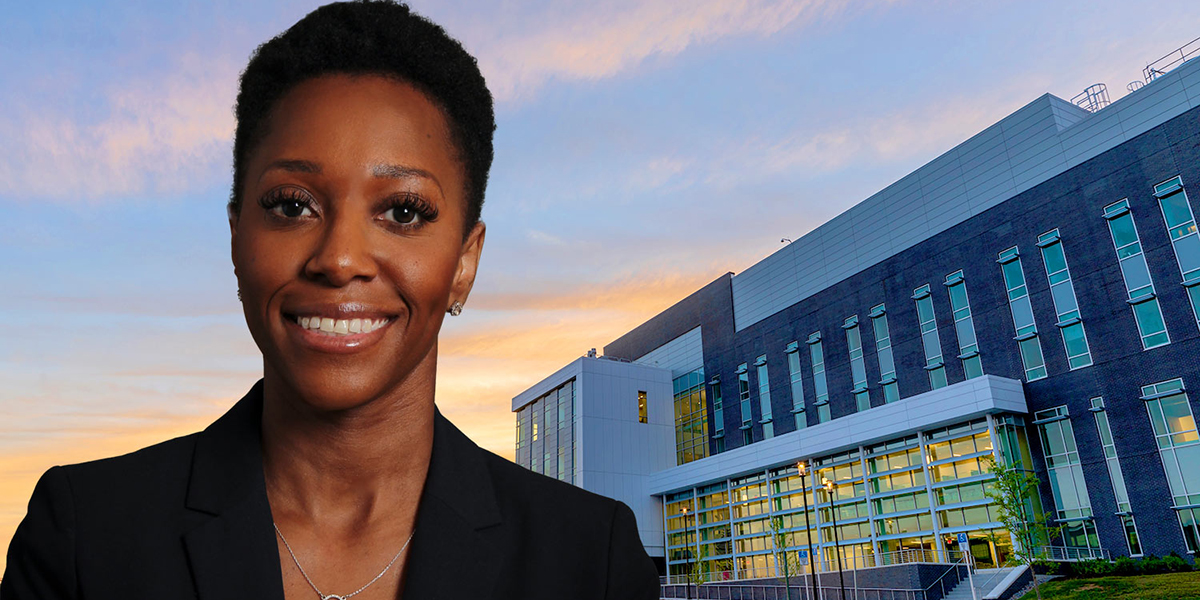Jessica Isaac uses all of her skills to support experiential education
Non-traditional path prepared her to juggle multiple priorities

Jessica Isaac has followed a non-traditional path to her current position as downstate experiential education coordinator and clinical assistant professor for the School of Pharmacy and Pharmaceutical Sciences. But it is serving her well.
She graduated with her PharmD from the University at Buffalo in 2014, but wasn’t really sure what she wanted to do with her degree.
“When I first got out, I took a job in retail pharmacy and realized it wasn’t for me, so I took lots of jobs — over 14 jobs in a short time span — always to see how far I could go without any additional training,” she said. “In 2018, I had done as much as I could do without additional training, so I did a fellowship at the University of Pittsburgh Medical Center in administrative leadership in health system pharmacy, and was introduced into academia with their partnership with the University of Pittsburgh. Then I applied to a job at Binghamton.”
Isaac uses her experiences of having so many different jobs in pharmacy practice to speak to students about opportunities that are out there. “It also gives me a chance to relate to all of our preceptors and the different sites that we have,” she added.
Isaac, who lives in Queens, is responsible for developing relationships and clinical rotation sites for SOPPS IPPE and APPE students anywhere from Poughkeepsie, N.Y., south to all five boroughs of New York City, and all of New Jersey.
“I wear many hats in the Office of Experiential Education,” she said, “but my primary responsibility is developing relationships and maintaining relationships with the clinical sites. I’m on the ground trying to develop them. It’s challenging because I’m the new kid on the block.”
SOPPS is a state school, so establishing ties with preceptors and sites where other schools like Long Island University and St. John’s have been around for over 100 years and can offer preceptors some kind of compensation for their services is a challenge she relishes, Isaac added.
“I’m asking for them to volunteer their time to help us out,” she said. “In addition to matching up where these locations are with where our students come from, I have to ensure our students have the ability to access these sites. Most people in New York City don’t drive, so I help with the site placements, making sure the sites make sense for the students. And I onboard them and troubleshoot from either end if necessary. I try to make sure the communication is streamlined and as seamless as possible.”
Isaac admits that juggling the many aspects of her job can be daunting, but she is “enjoying the ride.”
She teaches SOPPS students in the Clinical Education Center at Northwell Health’s Vivo Health Pharmacy, and sometimes drives to Johnson City to teach mainly P1 students at SOPPS as well. She prefers the face-to-face teaching where she can “feel people’s energy” to do her presentations, but she is also getting used to Zoom presentations as “the wave of the future.”
Her clinical site is also at Northwell’s Vivo Health Pharmacy, where she works in the patient management program. “I essentially speak to patients who are starting a specialty medication for perhaps a rare disease and assessing their knowledge level of their condition, how the medications work and filling in any gaps on the medication management side,” she said. “I do that telephonically. I don’t see these patients in person. But I do this two days a week and speak with about 20 patients each day.”
Her different roles break down to about 40% of her duties on the administrative end for the Office of Experiential Education, another 40% for teaching and precepting (yes, she also works with our students!), about 10% for service to students through advising student organizations and individual students, and the final 10% is saved for research, which Isaac is just getting into.
“I don’t have much training in research, but I’ll be focusing on students who have challenges for any number of reasons, not necessarily academic, but challenges due to diversity, equity and inclusion issues and determinants for success in life,” she said.
“This is a new venture for me, but something I know will help with our program and also across the board for experiential education in pharmacy practice,” Isaac said. “This kind of research is not being done. Nick [Schwier, assistant dean for experiential education and clinical associate professor] has been providing some guidance and support on how to do the research, and I’m very much interested in doing it. I’m very excited about bridging it into experiential education and being able to help our students be better prepared for pharmacy outside of clinical applications after they graduate.”
Isaac is thankful, as well, that she earned a mastery of teaching certificate through the University of Pittsburgh, which has prepared her for both teaching and precepting. “These are not my normal skill sets — teaching, precepting and doing research — so I’m learning,” she said. “The team I’m working with is amazing.”
